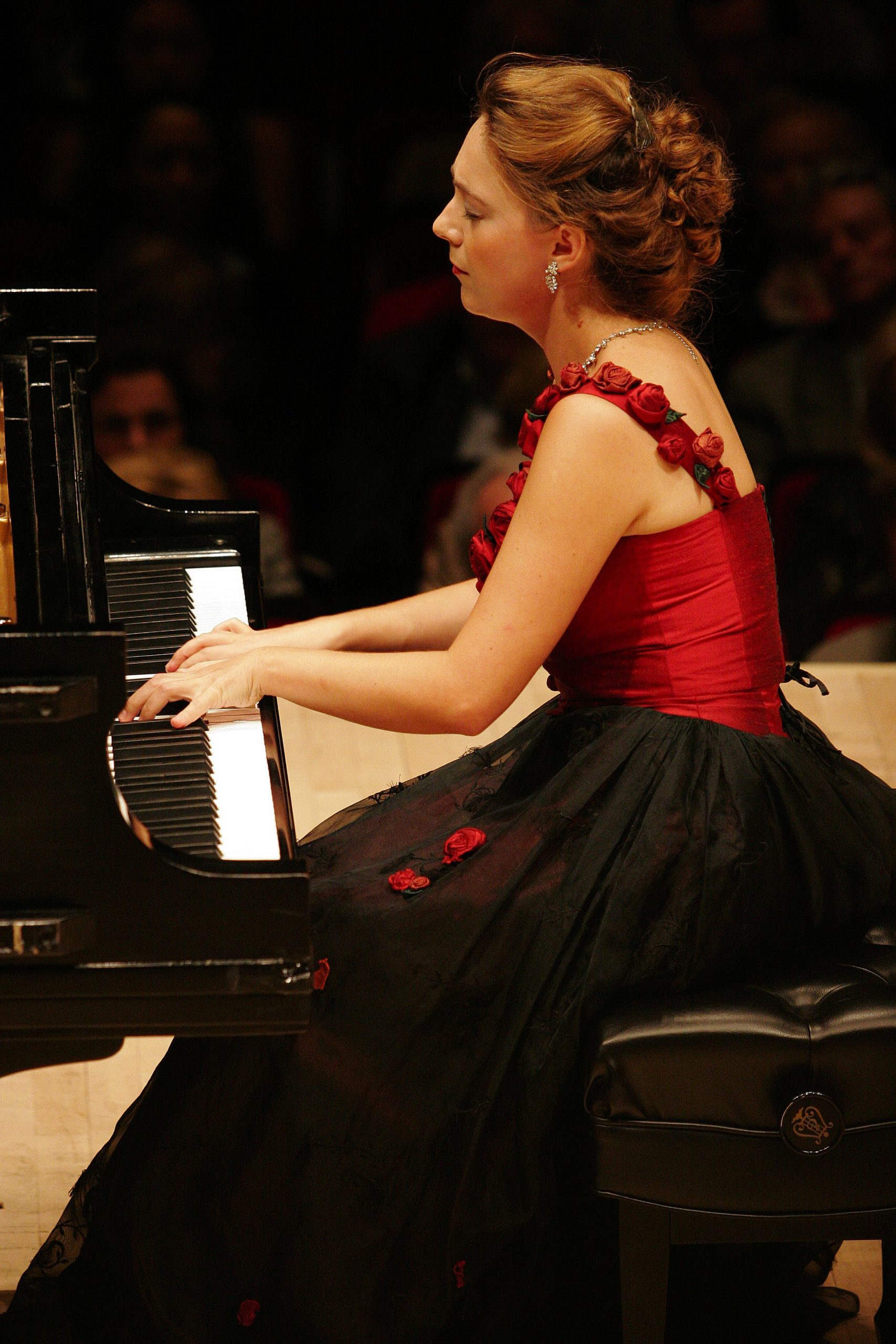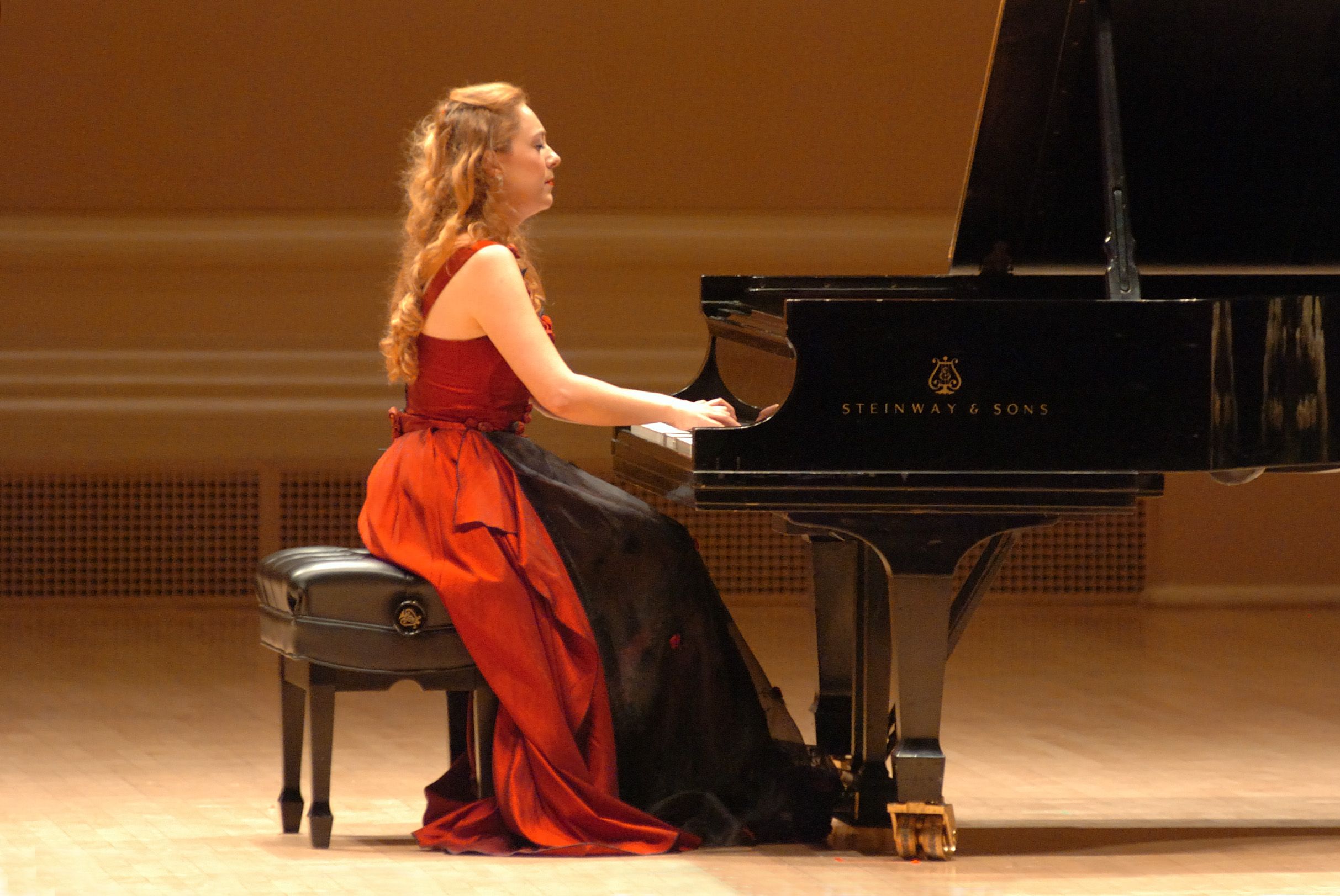Russian pianist Katya Grineva is set to make her 20th appearance at the famed Carnegie Hall. She currently holds the record for most solo performances by a single artist at the venue. During the lockdown, Katya was a part of an impressive 300 virtual concerts but is eagerly awaiting her return to the stage on December 27th.

Katya’s musical journey began by accident. Her neighbors invited the then five-year-old Katya for a walk. Along the way they passed open auditions for a music school. “I kind of got accepted because I just went along.” The news came as a surprise for Katya’s parents. “My mom said, we don’t even have a piano.” Thankfully her friends offered the use of their piano and so her parents decided to proceed with a trial. “They thought we’ll give it six months. If she shows any interest, then we’ll get a piano.”
Katya progressed well and at the end of the six months her teacher recommended it was time to get her own piano but that was no simple task. “It was a very difficult time. In Russia, at that time, we hardly had any food. People had to stay in line for hours to get food. So, to buy a piano was a really big deal because it’s expensive and the supply was not there.” In order to even be considered, a buyer had to be placed on a waiting list. “Every six months, there were shipments of some pianos from Europe. And if you’re lucky, maybe you’ll get one.”
Although it was a lengthy process, Katya eventually received a “beautiful upright” Simmerman piano all the way from Germany. But the gift came with conditions. “The day when the piano arrived, my mum called me to her room and said, ‘Look, you have your piano. Now, if you don’t want to practice, just tell me and we’ll sell it. And she wasn’t mean. She actually was just being very practical.”
For Katya though selling was never an option. “I fell in love with that piano. And the idea that somebody might sell it was an awful idea.” Because of this she made sure to practice. Katya was also able to develop her musicianship by attending concerts.
“Very luckily, my parents had amazing friends. They knew the most famous theater producer at that time… He was probably the most famous artistic person in Moscow. You couldn’t get tickets to the theater production. They were sold out years in advance. But he was friends with very famous composers and musicians. One of them was Alfred Schnittke, who is one of the most important composers of the last century. And he came to our home for dinner many times with his wife.”
Katya was privileged to play for Schnittke and received encouragement. “He said to my mum, ‘She’s talented’”.
Another talented acquaintance that made an impact on young Katya was one of the cello teachers at the Moscow Conservatory who had a soft spot for the budding pianist. “I became very close to her. And she helped me to go to the best school and study with the best teacher.” The teacher was Pavil Masner who also taught at the Moscow Conservatory. “He was the biggest inspiration for me as a young person.”
At fifteen, Katya was also able to see the famed pianist Vladimir Horowitz perform when she was fifteen. “We sat very close. I could see him in the fourth row. And that concert changed my life because he played so beautifully. I’ve never heard anything like that before. And I thought, I know how the music should sound.”
The performance so inspired Katya that she began spending ten hours a day. She remembers, “I would practice until midnight in a dark room, just searching for that sound.”
Her dedication paid off and Katya found success as a performer. In 1993 she performed for the first time in the United States with the Baltimore Symphony and then in 1998 she made her Carnegie Hall debut.
“I can’t even describe it… It’s like the first time in your life ever drinking pure water. And you know that taste of pure water is so amazing. If you never have pure water, you have it and your whole body feels it. And that’s how I felt playing at Carnegie Hall.” The sense of wonderment has never decreased for Katya. “Every time I go there to play, I feel the same. It never changes. It doesn’t matter how many times I always feel very nervous.” She describes the nerves as a good thing because it means always being prepared. “But then you have to kind of give yourself to the spirit and let the spirit conduct you.”
During the pandemic Katya found herself held up with a friend in Woodstock. “I like it because it has a wild nature. It still has a forest which is untouched. I grew up in Russia with forests all around me, so I love it.” Although the area was beautiful it held little opportunities to perform during the lockdown so like many other artists Katya looked to online performances. A friend recommended Zoom. “In the beginning, it was really bad quality,” but she persisted. “I start playing concerts like, four times a week for people. And that’s how I survived because all that fear and anxiety would go away while I played. And the same would be for people who join me. So, I created a completely new audience. I have people who join me from Albuquerque, New Mexico, till now.”
Mondays were concert day and she had loyal viewers who tuned in every time. “I survived because of that. I cannot imagine what I would do if I didn’t have a piano and couldn’t play for the people.” Of course, it is not the same sensation as playing to an audience in the same hall, “but at least I was able to share my music. And when I play, people feel it, even though it’s through Zoom.” It was important for her to keep up her skills performing and share the positive energy music brings.
Her concert on December 27th will mark Katya’s first concert at a major hall since covid. “I went there last Thursday to test pianos, and I was so nervous the night before. I actually got sick because I was so nervous. I’m like, I forgot, what if I can’t play on stage anymore? Like, how does it feel to play on this huge stage? But when I came there, I was so happy. I can’t tell you, this wave of energy just came over me. My heart opened and I was so happy. And I thought, whoever will come to this concert is going to be so happy because also I have a very beautiful program planned.” Being back on the Carnegie stage felt like “coming home” for her.
Holiday concerts for Katya include special favorites like “Ave Maria,” “Jesus, Joy of Man’s Desiring,” and a select movement from Tchaikovsky’s Nutcracker. Chopin is a favorite composer of hers so audiences can also expect to hear some of his work.
She will also be bringing a unique rendition of Ravel “Bolero.” It is normally played by eight to four pianos, but she has it arranged for a single piano. “I play just with two hands, and it’s very fascinating. Everybody always loves it. And then my friend Byron made those amazing transcriptions for me of ‘My favorite things’, and ‘I’ll be home for Christmas’. So I’m playing them at the end. That’s really different.” Another piece she will play is “Embraceable You” which she says is more on the crossover side. “I always feel like I want to play a variety, and it’s very important how you piece those things together. That’s what I spend most of my time on, figuring out what goes well with which piece… if you just find the right location for the piece, that piece will shine, and that’s what I spend a lot of time on. I’m excited about it. I’m so excited for the concert.”

Concert: Monday, December 27, 2021, 8:00 p.m.
Carnegie Hall, Stern Auditorium, Corner of 57th Street/7th Avenue, Train N/Q/R/W 57th St
Tickets: $50 and Up. To purchase, contact carnegiehall.org | CarnegieCharge 212.247.7800 | Box Office at 57th Street/7th Avenue
Interview with thanks to April Thibeault, AMT PR






